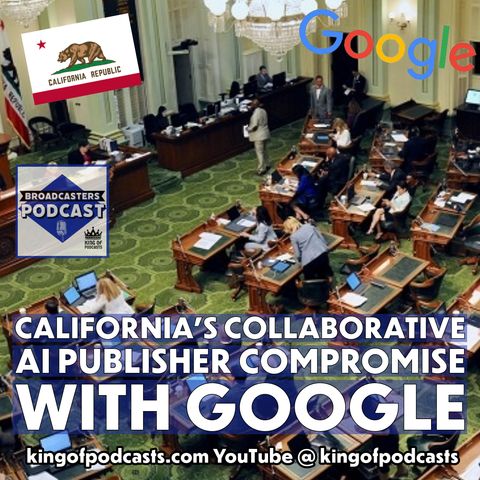California’s Collaborative AI Publisher Compromise With Google (ep.349)

Download and listen anywhere
Download your favorite episodes and enjoy them, wherever you are! Sign up or log in now to access offline listening.
California’s Collaborative AI Publisher Compromise With Google (ep.349)
This is an automatically generated transcript. Please note that complete accuracy is not guaranteed.
Description
California Strikes $175M Deal with Google to Support Local Journalism. The bills to tax or force arbitration failed, so a compromise was made. California lawmakers have reached an agreement with...
show moreCalifornia lawmakers have reached an agreement with Google to fund local journalism, shifting away from earlier proposals that would have forced tech giants like Google and Meta to directly pay news outlets for using their content. Instead, the agreement establishes a $175 million fund over five years to support local media in the state.
This deal involves Google contributing $55 million to a fund managed by UC Berkeley, the state providing $70 million, and an additional $50 million through Google's existing grants. Part of this initiative includes creating an artificial intelligence (AI) program to aid local newsrooms. The AI component, however, has sparked concerns among some journalists, who fear it could lead to further job losses in the media industry.
Critics, such as the Media Guild of the West, have expressed disappointment with the deal, arguing that it allows Google to maintain its monopoly over the news industry without addressing the systemic challenges facing local journalism. They claim the funding is insufficient compared to similar laws in countries like Canada and Australia, which have imposed stronger regulations on tech companies to pay news publishers directly.
While the agreement is seen by some as a positive step toward supporting struggling newsrooms, others view it as a concession to Big Tech, which continues to wield significant power in the digital landscape. The AI element of the deal, in particular, has been met with skepticism, as it may further entrench Google's influence over the media sector in California.
This compromise marks a shift in how California is handling the tech-news relationship, providing immediate financial relief to news outlets but leaving larger questions about the future of independent journalism unanswered.
California's new arrangement with Google, while groundbreaking, is not actually a bill. It's a public-private partnership aimed at supporting local journalism and AI research in the state. Here are the key details:
* **Funding:**
* The partnership will provide over $300 million over five years.
* Roughly $110 million will come from Google and $70 million from the state budget to boost journalism jobs.
* Google will also kick in $70 million to fund the AI research program.
* **Focus areas:**
* The money will be used for two main purposes:
* **News Transformation Fund:** This fund, managed by UC Berkeley's Graduate School of Journalism, will support local news organizations (excluding broadcasters) in California.
* **AI Innovation Accelerator:** This program will focus on developing AI tools to help solve real-world problems. The specifics of this program are still being finalized.
* **Reactions:**
* The agreement has received mixed reactions.
* Supporters see it as a crucial step in addressing the decline of local journalism and promoting innovation.
* Critics argue that it doesn't go far enough and that Google is getting off too easy compared to what could have been achieved through legislation. Some journalists also fear that the focus on AI could lead to job losses in the industry.
**Key points to note:**
* The agreement is the first of its kind in the U.S.
* It effectively ends a year-long fight between tech giants and lawmakers over a proposed "link tax" that would have required companies like Google to pay publishers for linking to their content.
* The partnership highlights the growing intersection of journalism and AI, with both potential benefits and concerns for the future of the industry.
The path leading to the current California-Google arrangement was not a straight one, and involved a complex interplay of factors and players. Here's a brief overview:
The Decline of Local Journalism: The backdrop is the ongoing crisis in local journalism, with newspapers struggling to stay afloat in the digital age. This led to calls for government intervention to support the industry.
Proposed "Link Tax" (AB 886): Assembly Bill 886, also known as the California Journalism Preservation Act, was introduced in early 2023. It proposed a "link tax" requiring tech companies like Google and Meta (Facebook) to pay publishers for linking to their content.
Intense Lobbying and Opposition: The bill faced fierce opposition from tech giants, who argued that it would harm the internet and stifle innovation. Intense lobbying ensued from both sides, with news publishers and tech companies spending millions to sway lawmakers.
Stalemate and Compromise: Despite numerous hearings and revisions, the bill remained stalled in the legislature. Recognizing the need for a solution, Governor Newsom stepped in to facilitate negotiations between the two sides.
The Partnership Agreement: After months of talks, the agreement was reached in August 2024. It effectively ended the fight over the link tax, opting instead for a public-private partnership to support journalism and AI research.
Contact KOP for professional podcast production, imaging, and web design services at http://www.kingofpodcasts.com
Support KOP by subscribing to his YouTube channel and search for King Of Podcasts
Follow KOP on Twitter or Facebook @kingofpodcasts
Listen to KOP’s other programs, Depraved and Debaucherous, Podcasters Row and the Wrestling is Real Wrestling Podcast
Information
| Author | King of Podcasts |
| Organization | King of Podcasts |
| Website | - |
| Tags |
Copyright 2024 - Spreaker Inc. an iHeartMedia Company

Comments